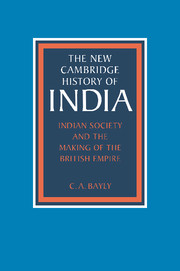Book contents
- Frontmatter
- Introduction
- 1 India in the eighteenth century: the formation of states and social groups
- 2 Indian capital and the emergence of colonial society
- 3 The crisis of the Indian state, 1780–1820
- 4 The consolidation and failure of the East India Company's state, 1818–57
- 5 Peasant and Brahmin: consolidating ‘traditional’ society
- 6 Rebellion and reconstruction
- Conclusion: the first age of colonialism in India
- Glossary of indian terms
- Bibliographical essay
- Index
- THE NEW CAMBRIDGE HISTORY OF INDIA
- Plate Section"
- References
6 - Rebellion and reconstruction
Published online by Cambridge University Press: 28 March 2008
- Frontmatter
- Introduction
- 1 India in the eighteenth century: the formation of states and social groups
- 2 Indian capital and the emergence of colonial society
- 3 The crisis of the Indian state, 1780–1820
- 4 The consolidation and failure of the East India Company's state, 1818–57
- 5 Peasant and Brahmin: consolidating ‘traditional’ society
- 6 Rebellion and reconstruction
- Conclusion: the first age of colonialism in India
- Glossary of indian terms
- Bibliographical essay
- Index
- THE NEW CAMBRIDGE HISTORY OF INDIA
- Plate Section"
- References
Summary
Three basic forces moulded the nature of Indian society in the early colonial period. First, social relations and modes of thought and belief which had consolidated themselves in the later years of Mughal India continued to develop under British rule. These were distorted or modified by the second range of influences which derived from the military and financial needs of the colonial state and from sporadic and uneven developments in the European world economy. In turn, armed and unarmed resistance from within India itself blunted and deflected these influences. So pressure and rebellion operating at all levels of political power within the subcontinent, provided the third determinant of the nature of colonial Indian society. Revolts and armed rebellions were not hopeless causes as the old District Gazetteers tended to suggest. On the contrary, they frequently forced the British to modify their system. In some cases the colonial authorities were constrained to deploy expensive armies to utterly uproot centres of resistance. This had been the case with some of the poligars of the far south or the Pindari raiders. More often collectors were forced to come to an accommodation with the powerful social groups who retained control of resources in the villages and small towns. Thus resisting village leaderships such as the mirasidars of parts of the wet South were afforded preferential treatment. Tribal magnates were selected out and given the rights of rajas. Recalcitrant princes retained some share of power within the system of native states. None of the rebellions and uprisings with which this chapter deals ‘succeeded’ in the sense that they were able to exclude the influences of the world market or the Company's state.
Keywords
- Type
- Chapter
- Information
- Indian Society and the Making of the British Empire , pp. 169 - 199Publisher: Cambridge University PressPrint publication year: 1988

